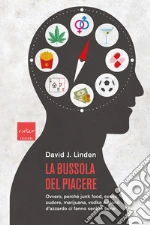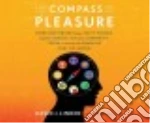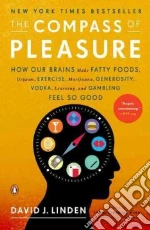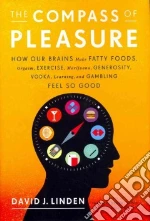 Libri di Linden David J. su Unilibro.it
)
Libri di Linden David J. su Unilibro.it
)
|
|
2021 |
 Title :
La bussola del piacere. Ovvero perché junk food, sesso, sudore, marijuana, vodka e gioco d'azzardo ci fanno sentire bene
Title :
La bussola del piacere. Ovvero perché junk food, sesso, sudore, marijuana, vodka e gioco d'azzardo ci fanno sentire beneAuthor: Linden David J. Publisher: Codice La sfera del piacere è sempre stata costretta da regole. Attraverso leggi, precetti religiosi e morali tutte le società hanno voluto imporre un confine che separi il piacere dal vizio e quindi il modo in cui affrontarne il "lato oscuro": la dipendenza. Le moderne tecniche d'indagine sul nostro cervello raccontano però una storia diversa; e ci dicono che molti comportamenti che consideriamo virtuosi, come pregare o fare beneficenza, attivano lo stesso circuito neurale su cui agiscono, per esempio, le droghe e l'alcol, e che la dipendenza non è frutto di una scarsa forza di volontà bensì un disturbo di natura fisiologica. I confini di cosa è bene e cosa è male, di cosa separa il socialmente accettabile dal moralmente deplorevole sono quindi, nella realtà scientifica, molto più sfumati di quanto pensassimo. Una sfida notevole, quella lanciata dalle neuroscienze, che ci porta a ripensare gli aspetti culturali, morali e giuridici che danno forma alla nostra identità e alla nostra presenza all'interno della società. «Lo shopping, l'orgasmo, il crack, la meditazione, l'esercizio fisico, l'oppio, [...]; tutto questo produce segnali neurali che convergono su un piccolo gruppo di aree cerebrali interconnesse. Ed è proprio qui, in questi piccoli ammassi di neuroni, che il piacere umano viene percepito.» € 23,00
|
|
|
1918 |
 Title :
Think Tank
Title :
Think TankAuthor: Linden David J. (EDT) Publisher: Yale Univ Pr € 22,30
|
|
|
1916 |
 Title :
The Compass of Pleasure
Title :
The Compass of PleasureAuthor: Linden David J., Pratt Sean (NRT) Publisher: Baker & Taylor € 54,20
|
 Title :
The Compass of Pleasure
Title :
The Compass of PleasureAuthor: Linden David J., Pratt Sean (NRT) Publisher: Baker & Taylor € 25,50
|
 Title :
Saving the Earth As a Career
Title :
Saving the Earth As a CareerAuthor: Hunter Malcolm L. Jr., Lindenmayer David B., Calhoun Aram J. K. Publisher: John Wiley & Sons Inc € 48,60
|
 Title :
Touch
Title :
TouchAuthor: David J. Linden Publisher: VIKING € 12,10
|
 Title :
Touch
Title :
TouchAuthor: Linden David J. Publisher: Penguin Group USA € 15,20
|
|
|
1914 |
 Title :
Expanders for Oil and Gas Operations
Title :
Expanders for Oil and Gas OperationsAuthor: Singh Murari, Drosjack Michael J., Linden David H. Publisher: McGraw-Hill Full coverage of the expander machines used to extract power from waste fluid gas in the chemical process and refining industriesExpanders for Chemical Process describes the engineering analyses required to design and build expanders for particular applications. In an ever-increasing push toward energy conservation, sustainability, green manufacturing, and green chemistry, chemical plants are recovering waste fluid gas energy using expanders. This book explains how to harvest this energy to power other machines. In each case, there are unique conditions that require specialized design and applications. This timely guide offers complete details on expanders.
€ 122,30
|
|
|
1912 |
 Title :
The Compass of Pleasure
Title :
The Compass of PleasureAuthor: Linden David J. Publisher: Penguin Group USA A leading brain scientist's look at the neurobiology of pleasure--and how pleasures can become addictions. Whether eating, taking drugs, engaging in sex, or doing good deeds, the pursuit of pleasure is a central drive of the human animal. Here, Johns Hopkins neuroscientist David J. Linden explains how pleasure affects us at the most fundamental level: in our brain. As he did in The Accidental Mind, Linden combines cutting-edge science with entertaining anecdotes to illuminate the source of the behaviors that can lead us to ecstasy but that can easily become compulsive. Why are drugs like nicotine and heroin addictive while LSD is not? Why has the search for safe appetite suppressants been such a disappointment? The Compass of Pleasure concludes with a provocative consideration of pleasure in the future, when it may be possible to activate our pleasure circuits at will and in entirely novel patterns.--From publisher description. € 15,20
|
|
|
1911 |
 Title :
The Compass of Pleasure
Title :
The Compass of PleasureAuthor: Linden David J. Publisher: Penguin Group USA A leading brain scientist's look at the neurobiology of pleasure-and how pleasures can become addictions. Whether eating, taking drugs, engaging in sex, or doing good deeds, the pursuit of pleasure is a central drive of the human animal. In The Compass of Pleasure Johns Hopkins neuroscientist David J. Linden explains how pleasure affects us at the most fundamental level: in our brain. As he did in his award-winning book, The Accidental Mind, Linden combines cutting-edge science with entertaining anecdotes to illuminate the source of the behaviors that can lead us to ecstasy but that can easily become compulsive. Why are drugs like nicotine and heroin addictive while LSD is not? Why has the search for safe appetite suppressants been such a disappointment? The Compass of Pleasure concludes with a provocative consideration of pleasure in the future, when it may be possible to activate our pleasure circuits at will and in entirely novel patterns. € 20,70
|
|
|
2009 |
 Title :
La mente casuale. Come l'evoluzione del cervello ci ha dato l'amore, la memoria, i sogni e Dio
Title :
La mente casuale. Come l'evoluzione del cervello ci ha dato l'amore, la memoria, i sogni e DioAuthor: Linden David J. Publisher: Centro Scientifico Editore L'avrete già visto molte volte: un cervello umano inquadrato ad arte, la telecamera che gli gira intorno come un elicottero e una voce impostata e commossa che ne esalta le straordinarie qualità progettuali. Ebbene, niente di più falso. Leggendo questo libro appassionante, imparerete da uno dei più importanti neuroscienziati del mondo che in realtà il nostro cervello è il frutto casuale, imperfetto e contraddittorio di una complessa storia evolutiva. David Linden accompagna il lettore alla scoperta dello strano e spesso illogico mondo delle funzioni neuronali, rivelando passo dopo passo come nel corso di milioni di anni dal cervello e con il cervello si siano sviluppati quei caratteri peculiari che sono alla base del nostro essere umani: sensazioni ed emozioni, sesso e amore, sogni e pensiero religioso. Un inedito viaggio al centro della mente, brillante e accessibile, insieme rigoroso e leggero. € 19,00
|
|
|
2008 |
 Title :
The Accidental Mind
Title :
The Accidental MindAuthor: Linden David J. Publisher: Belknap Pr You've probably seen it before: a human brain dramatically lit from the side, the camera circling it like a helicopter shot of Stonehenge, and a modulated baritone voice exalting the brain's elegant design in reverent tones. To which this book says: Pure nonsense. In a work at once deeply learned and wonderfully accessible, the neuroscientist David Linden counters the widespread assumption that the brain is a paragon of design--and in its place gives us a compelling explanation of how the brain's serendipitous evolution has resulted in nothing short of our humanity. A guide to the strange and often illogical world of neural function, The Accidental Mind shows how the brain is not an optimized, general-purpose problem-solving machine, but rather a weird agglomeration of ad-hoc solutions that have been piled on through millions of years of evolutionary history. Moreover, Linden tells us how the constraints of evolved brain design have ultimately led to almost every transcendent human foible: our long childhoods, our extensive memory capacity, our search for love and long-term relationships, our need to create compelling narrative, and, ultimately, the universal cultural impulse to create both religious and scientific explanations. With forays into evolutionary biology, this analysis of mental function answers some of our most common questions about how we've come to be who we are. € 27,60
|
|